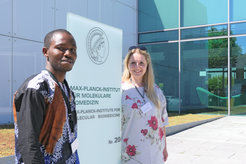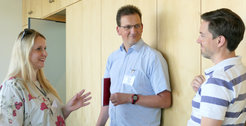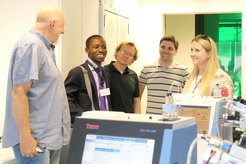Exclusive insights into the world of Max Planck research
Next-generation elite attending the Lindau Nobel Prize winners' meeting visit the Max Planck Institute for Molecular Biomedicine
At the end of June, some 600 junior scientists from all over the world met with 39 Nobel Prize winners in Lindau. The annual Nobel Prize winner conferences in Lindau promote dialogue between scientists of different generations, cultures and disciplines. This year, the Max Planck Society (MPG) selected 20 young researchers to attend the meeting. In 2017 the MPG initiated a post-event programme to follow on from the official meeting so as to further intensify dialogue between Max Planck scientists and the up-and-coming elite: After the Lindau conference, selected young scientists get to spend two days at a Max Plank Institute (MPI) of their choice. For Ewa Blaszczak from Poland and Oluwafemi Kale from Nigeria, this was how a dream came true at the MPI for Molecular Biomedicine on 2 – 3 July.

"It was superb," says Oluwafemi Kale with a radiant smile. The young scientist from Nigeria has wanted to go to the Max Planck Institute in Münster ever since obtaining his degree in pharmacology. He applied for the Institute's doctorate programme several times but narrowly failed to get accepted. He's now doing his doctorate in Nigeria, involving a pharmacological and toxicological examination of various aspects of popular medicine. "The visit was extremely helpful because I was able to discuss with scientists here some of the challenges my project is facing in the area of molecular biology", says Oluwafemi Kale.
"I also think it was immensely valuable to be able to engage with the scientists here," says Dr. Ewa Blaszczak, who studied Biology and English. She particularly wanted to meet Research Group Leader Dr. Juan M. Vaquerizas to start a collaboration with his group. "I am looking into a certain kind of protein modification that is involved in protein quality control, signal transduction and cell cycle control," explains Ewa Blaszczak. "But at the moment, my project is leading me into the area of genomic analysis of transcriptional regulation – and Dr. Vaquerizas is an expert in this field. So I got some great input for my project."

Over the course of the two-day visit, Ewa Blaszczak and Oluwafemi Kale were able to talk to all department heads and group leaders, as well as presenting their own research to Institute employees. "The visit to the Max Planck Institute was a great enrichment for us and an excellent way to round off the Nobel Prize winner conference," the two agreed.
The programme for the two junior scientists was arranged by Michael Glatza and Dr. René Hägerling, who attended the Nobel Prize winners' meeting in Lindau themselves four years ago. "We know from our own experience that meeting the Nobel Prize winners can be very inspiring but also quite tiring. This is why we wanted to schedule in time for our guests to be able to experience something of the life and people here in Münster," says René Hägerling, postdoc at the MPI for Molecular Biomedicine. So Michael Glatza and René Hägerling showed Ewa Blaszczak and Oluwafemi Kale the best of the city – which included going to World Cup public viewing sessions together. On the last day of the visit, the research visit was rounded off with a walk around Lake Aasee under a clear blue sky.

The two Lindau alumni were also involved in selecting the two candidates. "It was very difficult to choose two from among the 12 candidates who wanted to come to our MPI. They definitely all deserved to be chosen," says Michael Glatza, doctoral student at the Max Planck Institute for Molecular Biomedicine. A total of 79 young scientists from abroad applied for the MPG post-event programme, two of whom were specifically interested in visiting the MPI in Münster. "We hope that Ewa and Oluwafemi continue to be as successful as they are now and that we've been able to support them to some extent," says Michael Glatza. "Whatever the case may be, it was certainly great fun for us to have had Ewa and Oluwafemi here to visit."

Ewa Blaszczak and Oluwafemi Kale would like to thank the Max Planck Society for the invitation and the Max Planck Institute for Molecular Biomedicine for great hospitality and discussions. Ewa Blaszczak has also been supported by the Foundation for Polish Science (FNP) and the Polish National Science Centre (NCN). Oluwafemi Kale was supported by the Eva Luise und Horst Köhler Stiftung für Menschen mit Seltenen Erkrankungen and the Robert Bosch Stiftung.



